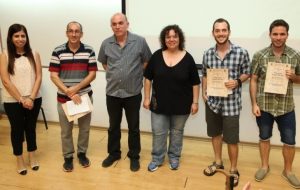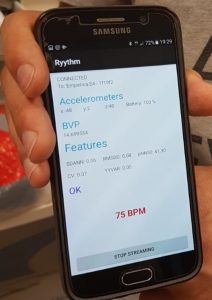Atrial Fibrillation Alert? There’s an App for That
The first prize final project at the Technion Faculty of Biomedical Engineering conference
With a cellphone app to predict and diagnose atrial fibrillation, Technion-Israel Institute of Technology students Noam Keidar and Gal Eidelstein won first prize at the recently held Technion Faculty of Biomedical Engineering Final Project Exhibit Competition. The project was mentored by Assistant Professor Yael Yaniv of the Faculty of Biomedical Engineering.

First prize, from right to left: Winners Noam Keidar and Gal Eidelstein, Dr. Doron and Liat Adler, Assistant Professor Netanel Korin and Maria Huri.
Atrial fibrillation is a dangerous heart disorder treated with a defibrillator, a device found today in many public areas. Immediate treatment of atrial fibrillation can save approximately 90% of patients, but each minute that passes after the event lowers the survival rate by approximately 10%, making early or immediate diagnosis critical.
The student-developed app predicts events at least 4 minutes in advance – with a 100% prediction rate. Such a warning enables early referral of the patient for medical assistance or treatment with a defibrillator. The app is based on recordings of the electrical activity of the heart (ECG) of many healthy people and deep learning (stratified neuronal networks). In addition to the life-saving and clinical damage-prevention potential of this app, the system is expected to provide the research community with extensive information about the evolvement of atrial fibrillation.
The novel project was recently presented at the Technion’s Faculty of Biomedical Engineering Final Projects Exhibit. The exhibit displayed 23 projects of fourth-year, undergraduate students at the faculty. The projects involved are in three main disciplines: (1) imaging and medical signal processing, (2) biomechanics and (3) flow, biomaterials and tissue engineering.
Associate Professor Amir Landesberg, who has spearheaded the exhibit for the past few years, presented the dramatic global biomedical engineering trends. He noted that approximately $2 billion is invested each year in Israel alone and that the annual growth rate in this field stands at approximately 7%.
“To date, our Faculty has 1,108 graduates, 96% of whom work in the field and approximately 13% of whom are senior managers in industry,” said Landesberg. “Biomedical engineering is an essential element of future medicine – predictive, preventative, personalized and precise medicine.”
Other top prizes during the exhibition sponsored by Dr. Doron and Liat Adler were:
Second prize was awarded to Shunit Polinsky, who developed a user interface for a printed robotic hand, under the guidance of Dr. Yoav Medan and Yair Herbst of the Faculty of Biomedical Engineering and Mechanical Engineering and the nonprofit organization Haifa D3, which engages in the development of low-cost, personalized bionic hands. Polinsky developed a lightweight, rotating hand, which can be actuated by a healthy leg or hand. Use of the robotic hand is intuitive and enables a broad range of movements, including holding a disposable cup filled with water. The price of the hand is estimated at approximately 100 dollars while existing bionic hands cost tens of thousands of dollars.
Noah Michael and Zemach Bar-Mocha won third place for their project on degradable scaffolds for spinal cord injuries, prepared using 3D printing and freeze-drying. The students developed a degradable polymeric scaffold suitable for treatment of injured spinal cords. The scaffold was fabricated by 3D printing, can be tailored to patient specifications and the implant is integrated relatively rapidly into the spinal cord. The project was directed by Ben Kaplan from the laboratory of Professor Shulamit Levenberg of the Faculty of Biomedical Engineering.
The “Audience’s favorite” Prize was awarded to Nofar Azoulay and Eyal Habif, who developed a platform for drug transfer via artificial saliva, a work mentored by Shani Elias Krema from the laboratory of Associate Professor Josue Sznitman of the Faculty of Biomedical Engineering.



